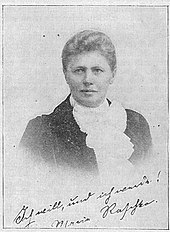Marie Raschke
Marie Alwine Ottilie Raschke (born January 29, 1850 in Gaffert , Stolp district , † March 15, 1935 in Berlin ) was one of the leading lawyers of the German women's movement and at the same time one of the first German lawyers.
Life
She was the daughter of the Pomeranian manor owner Johann Raschke and his wife Johanna, née Piepkorn. In 1879 she had to go to Berlin for economic reasons , having previously lived on her parents' estate. She passed the teacher examination in 1880 and worked until 1899 as a teacher at a secondary school for girls . In 1889 she founded the Association of Berlin Elementary School Teachers .
She was involved in the women's movement and sat together with Minna Cauer , Marie Stritt and Cäcilie Dose in the legal commission of the Federation of German Women's Associations . In view of the civil code , which is still being planned , Raschke wrote “The woman in the new civil code”, with which the BDF founded a petition to the Reichstag in 1895. The BDF hoped to prevent women-discriminatory and patriarchal passages in family law . However, nothing changed when the unchanged BGB came into force in January 1900. From 1896 she was a guest lecturer in law in Berlin, making her one of the first women to study law in this way. In view of the hurdles and restrictions, Raschke and Anita Augspurg founded the Association for Women's Studies in 1896 , which was dissolved two years later and re-established as the Women's Education Association . Until 1908/09, women were not allowed to study at a university in Germany and could not take the legal state examinations in Germany, and consequently also no professional qualifications for legal professional practice in administration and in the judiciary.
Before the turn of the century, university degrees in law were only possible for German women in Switzerland; in 1887 Emilie Kempin-Spyri was the first Swiss woman to do her doctorate there. Raschke also completed her studies in 1899 at the University of Bern and received her doctorate on the dogmatic problem of "dolus" in common law and fraudulent deception in the BGB with the grade "magna cum laude". Her dissertation was in the legal and political studies of Dr. Emil Ebeling published as Book VI. Raschke's goal of her legal studies, which was declared as early as 1897, was to establish a new subject called “legal studies” or “legal studies” as a school subject. Such knowledge was not taught in teacher training at the time.
In 1900 she became a member of the Berlin Legal Society. In 1900, under the direction of Raschke, eight German legal protection associations , which arose at the suggestion of Marie Stritt, merged to form the " Centralstelle deutscher Rechtsschutzstellen für Frauen " - the Centralstelle lost its importance a few years later and was overtaken by another association. Raschke published the “ Zeitschrift für popular Rechtsskunde ” from 1900 to 1902 and won Josef Kohler and Paul Mühsam as guest authors. This later resulted in further series: “Legal books for the German people” in seven volumes and “Popular legal catechisms” in nine volumes. In 1904 she became a member of the German Lawyers' Association . She represented clients in court and offered law courses even without the required admission as a lawyer.
In 1908 she became chairwoman of the women's bank's supervisory board and at the same time editor of the magazine “Frauenkapital” (until 1915). In 1914 she was a founding member of the German Lawyers Association with Margarete Berent and Marie Munk .
literature
- NN: On the women's movement. A lawyer , in: Deutscher Hausschatz, Volume 26, No. 48, p. 924. With portrait photography.
- Christiane Berneike: The question of women is a question of law. The lawyers of the German women's movement and the civil code. Nomos Verlag, Baden-Baden 1995, ISBN 3-7890-3808-3 , pp. 67-80.
- Oda Cordes: Marie Munk (1885–1978). Life and work. Böhlau Verlag, Cologne Weimar Vienna 2015, ISBN 978-3-412-22455-4 , pp. 893–898.
- Tilman Repgen: Raschke, Marie Alwine Ottilie. In: New German Biography (NDB). Volume 21, Duncker & Humblot, Berlin 2003, ISBN 3-428-11202-4 , p. 159 f. ( Digitized version ).
Web links
- Literature by and about Marie Raschke in the catalog of the German National Library
- Short biography ( Memento from June 11, 2007 in the Internet Archive )
| personal data | |
|---|---|
| SURNAME | Raschke, Marie |
| ALTERNATIVE NAMES | Raschke, Marie Alwine Ottilie |
| BRIEF DESCRIPTION | German lawyer |
| DATE OF BIRTH | January 29, 1850 |
| PLACE OF BIRTH | Gaffert , Stolp district |
| DATE OF DEATH | March 15, 1935 |
| Place of death | Berlin |
